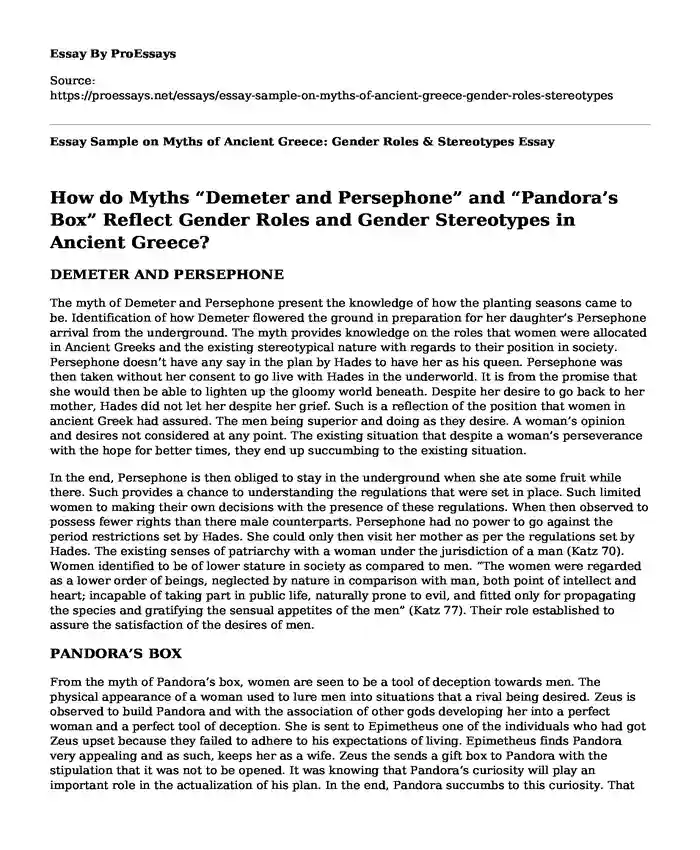How do Myths “Demeter and Persephone” and “Pandora’s Box” Reflect Gender Roles and Gender Stereotypes in Ancient Greece?
DEMETER AND PERSEPHONE
The myth of Demeter and Persephone present the knowledge of how the planting seasons came to be. Identification of how Demeter flowered the ground in preparation for her daughter’s Persephone arrival from the underground. The myth provides knowledge on the roles that women were allocated in Ancient Greeks and the existing stereotypical nature with regards to their position in society. Persephone doesn’t have any say in the plan by Hades to have her as his queen. Persephone was then taken without her consent to go live with Hades in the underworld. It is from the promise that she would then be able to lighten up the gloomy world beneath. Despite her desire to go back to her mother, Hades did not let her despite her grief. Such is a reflection of the position that women in ancient Greek had assured. The men being superior and doing as they desire. A woman’s opinion and desires not considered at any point. The existing situation that despite a woman’s perseverance with the hope for better times, they end up succumbing to the existing situation.
In the end, Persephone is then obliged to stay in the underground when she ate some fruit while there. Such provides a chance to understanding the regulations that were set in place. Such limited women to making their own decisions with the presence of these regulations. When then observed to possess fewer rights than there male counterparts. Persephone had no power to go against the period restrictions set by Hades. She could only then visit her mother as per the regulations set by Hades. The existing senses of patriarchy with a woman under the jurisdiction of a man (Katz 70). Women identified to be of lower stature in society as compared to men. “The women were regarded as a lower order of beings, neglected by nature in comparison with man, both point of intellect and heart; incapable of taking part in public life, naturally prone to evil, and fitted only for propagating the species and gratifying the sensual appetites of the men” (Katz 77). Their role established to assure the satisfaction of the desires of men.
PANDORA’S BOX
From the myth of Pandora’s box, women are seen to be a tool of deception towards men. The physical appearance of a woman used to lure men into situations that a rival being desired. Zeus is observed to build Pandora and with the association of other gods developing her into a perfect woman and a perfect tool of deception. She is sent to Epimetheus one of the individuals who had got Zeus upset because they failed to adhere to his expectations of living. Epimetheus finds Pandora very appealing and as such, keeps her as a wife. Zeus the sends a gift box to Pandora with the stipulation that it was not to be opened. It was knowing that Pandora’s curiosity will play an important role in the actualization of his plan. In the end, Pandora succumbs to this curiosity. That results in the release of various sources of pain into the world.
Women are then identified for their witty nature with the creation of troublesome situations to men (Seitkasimova 52). “Myths and literature abound with female characters trying their best to derail the plans of male heroes, from the supreme witch Medea to the deadly, if lovely, Sirens” (Seitkasimova 52). They are existing Greek theories of women playing a significant role in the failures of their male counterparts. Men were then failing to detect such situations from the appearances of beautiful women. The assumption that they are wonderful beings and as such, can never go against a man’s instructions. Such also established not to assure a woman’s loyalty to their man. They then termed as the weakest link in the composition and environment of any man.
Works Cited
“Demeter and Persephone.” Myths and Legends. E2BN,2006, http://myths.e2bn.org/mythsandlegends/textonly562-pandoras-box.html. Accessed 28 May 2020.
Katz, Marilyn. “Ideology and “The Status of Women” in Ancient Greece”. History and Theory, Vol. 31, No. 4, 1992, pp. 70-97. https://www.jstor.com/stable/2505416“Pandora’s Box.” Myths and Legends. E2BN, 2006, http://myths.e2bn.org/mythsandlegends/textonly562-pandoras-box.html. Accessed 28 May 2020.
Seitkasimova, Zhulduz A. “Status of Women in Ancient Greece” Open Journal for Anthropological Studies, vol. 3, no. 2, 2019, pp. 49-54. https://doi.org/10.32591/coas.ojas.0302.03049s
Cite this page
Essay Sample on Myths of Ancient Greece: Gender Roles & Stereotypes. (2023, Sep 17). Retrieved from https://proessays.net/essays/essay-sample-on-myths-of-ancient-greece-gender-roles-stereotypes
If you are the original author of this essay and no longer wish to have it published on the ProEssays website, please click below to request its removal:
- Literary Analysis Essay on There is A River in Me by Dian Million
- Impact of Single Parenthood on a Child's Development - Research Paper
- Essay on Racial Discrimination: Jury System's Role in Perpetuating Inequality
- Essay Example on Nurses' Ethics: A Grim Reminder During Nazi Era
- Essay Sample on Serving the Community: Managing the Istanbul Football Academy in Nairobi, Kenya
- The Neolithic Era and Revolution - Free Paper Example
- Essay Sample on The Murder of the Slave Master in "Celia, A Slave"







